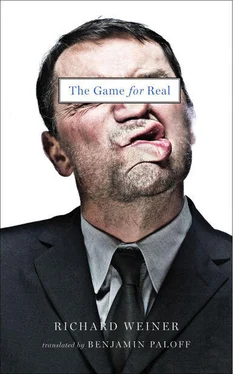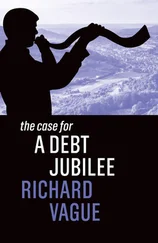He had gone to sleep late, and after a day of robbery. For precisely this reason, and having waded through a dream that was, as always, merely a more pronounced sense of the preceding day, he wakes up with the sun. The window of the family boarding house where he has been sleeping faces east. He is the first and silent witness to the luminous bloodletting between the day, which has struck all of a sudden, and the night, which is no coward. The light has not triumphed, but triumph it will. The darknesses cover themselves in twilight, but even this rearguard is already losing hope; it, too, is turning to flee. The light is still struggling; its empire is not, as yet, getting old, for it is still struggling; it is a dominion only just founded, unsteady for now; it is imperious and skittish like a youth to whom decline has not yet given a thought. It is a brief light, undoubting and kindred, as only that which is from us can be. The awakened man wakes in that dream on the edge of waking, toward which sleepers wade, those who have nodded off beneath the open sky and have been struck with a spike of sun nearing its peak, a spike as slenderly efficacious as a mosquito’s proboscis. Just as it is for them, so too is it for him, that he doesn’t wake up so much as he revives: he’s the one who revived the birds-of-paradise, the lianas, and the little hearts before him, before him the darkness and its rearguard are fleeing. He is himself the triumphant light, for it takes his side as zealously as one should only side with oneself. He is a light within which this somewhat absurd land is sinking, but it’s a land that is naturally and invulnerably absurd. It’s an impossible land, but it’s truly, indispensably, and reliably impossible. He knows it from somewhere already. It’s the same one that recently washed him ashore, and which he’d already nearly forgotten. Now that he’s aware of it, he is also aware of why he hadn’t been aware of it till now: he hadn’t been aware of it because he’d been identical with it. He knows he is happy.
He is happy. But because he has become aware of it, he’s already less so. He recognizes it by a sort of disappointment that has broken in to rob him. He already knows what this disappointment is: that he won’t get to go back. . back somewhere. But where? Where? He’d be glad, at least, to see that far, but how can you see as far as somewhere that can no longer be visualized? What one can no longer visualize. . What else is it — but how natural! And still how slowly it dawns on us nonetheless! — what is it but that which he hasn’t recognized? Now he’s on the right track: what he hasn’t recognized, and where he nevertheless has an urge to go back to, is that perfect happiness of which one is unaware. He feels like going back to where he was unknowingly happy. He isn’t afraid for his happiness, but he’s aware of it; he’s capable of sizing it up; he is— so it isn’t an infinite happiness; so it’s an endangered happiness. If he starts measuring it up, he’ll get to its limits. He’s afraid of this, but a proprietary instinct is stronger than fear. His hands, till now folded beneath his head, have shifted — they slide, they grope, they stretch. They’ve jerked, righted themselves; they were pondering. They’ve sensed, as it were, a new, unknown state. It was strange; it was an awakening. It was the recognition that he, who until now had not known anything about himself beyond that he is, had also already been, and would yet be. It was him discovering duration and sequence, it was the discovery of past and future. He had reached into a tangle of little snakes. The screeching birds-of-paradise, swaying lianas, and beating “little hearts” went quiet and froze, like magic. They went quiet under a shadow so unnaturally sudden and dark that the awakened man shifted his head to ascertain its cause.
What did he see that was so god-awful that his extremities, envenomed by a hideous, rushing spasm, now lie so mortally limp? I know, for this man is my affair. But do you understand, you whose name is not Shame? — This spasm of his extremities, this terror — it was because, having turned his head, he recognized that the day, the day beneath the heavens, was unspoiled in its ardor; that the shadow that had fallen had not crept in from there. From where, then? Where, then, did this purgative of colors and cries come from, of birds-of-paradise, lianas, and “little hearts”—where, if not from within him, this person?
He saw the blaring day raised on a fiery baroque pillar, but he was waking up in the rattling daybreak that rouses the condemned and ushers in the day he has feared for so long, hoping and despairing of hope, and that is, faithfully, as he had feared: ashily authentic, with hands dejectedly folded.
“. . but then maybe Zinaida didn’t believe it after all. Zinaida surely didn’t believe it for a second. So what if it seemed. . She didn’t believe it — it can’t be! — she didn’t believe it.”
Zinaida was a name that hadn’t just popped up here. Fine, then, if it has already appeared, he knows where to put it. He isn’t embarrassed about it. The name Zinaida is pliable and bent, like a tendril — a tendril so deliciously curved that the eyes can’t resist it. They descend along it slowly and cautiously, as though down a trail through wilderness. The eyes are making good progress down it; their faith in it is steadfast. The name Zinaida is worthy of such faith. It leads, knowing precisely where to, no matter that it feigns indifference as to where it leads.
At first, lying there, he noticed the name; then, sitting up and hugging his knees, he stared at it; and a moment later, looking again at the cretonne wallpaper and realizing that he was now looking at it, he caught on that he’d gotten here by Zinaida’s name, that it had led him here. The birds-of-paradise, lianas, and “little hearts” had now snuck out of the shadow again, things had cleared up, but quietly, like a legend that no one tells anymore. Something is replenishing it, dragging it out, he’d overlooked it till now: to the universe of birds-of-paradise, lianas, and “little hearts” there now also belongs a Chinese pagoda with two small figures. One of them is Zinaida. Luck. But maybe it’s not merely luck that the pagoda with the little figures, all of them together, form, as it were, something tantamount to a name. That name: Zinaida.
The many things that can come of the name Zinaida! Now, now it has become so transparent that it is as if nothing. You see through it.
Through it you see yesterday morning; through it you see how he had gotten up with newborn ardor like that of newcomers, when they’ve awoken somewhere they’ve never been before, and where they’d only just arrived the night before in the dark. The yard of the old mill between the dense willows and the millhouse; the slow, rich stream that crept down beneath the shed, where the dismantled mill components loll about. A stream that fades away, that is, that leads astray; beyond its subsequent fate, which seems mysterious and is merely smallish: a meadow with a horizon beyond our sight, and the mill pool, before which the stream has slowed in the meantime, and where it will momentarily laze. In the yard, its black, furtively flowing water looked out over nothing more than the layabout lounging in the verdure; it issued a vague, noncommittal, rather suspicious promise. It was on just this promise that he had set off for the meadowlands. He was thinking of taciturn hobos who’ve grown so accustomed to their stride that even their stance is as if in motion, and being seated is merely as though another way of walking, indifferent to where, and yet still not without need: they, too, drag those alluring and admonitory promises behind them, like fluttering veils. — You can see (see through the gauzy name Zinaida) how he’d come to the pool, removed his sandals, pulled off his pajamas, and dipped his legs. Before him, a maple shrub like a straw basket, with birdsong. You can see him sitting between two little birches. The youths in Jan Preissler’s paintings, too, sit beneath birch trees. You could see that he is a beautiful youth, for in such dawning it’s a short way from was to is . Along the grassy trail — velvet — a girl walks with a pail. She’s arrived at the pool, said hello, readied herself to gather water. He’s shifted, for he’d been in the way. He’s lifted his head, for he’d ventured to think that from was to is it’s a short way for real, and this notion has given him courage.
Читать дальше












